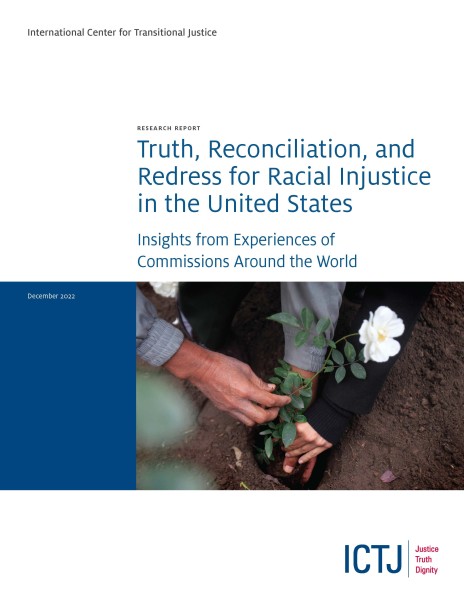We work side by side with victims to obtain acknowledgment and redress for massive human rights violations, hold those responsible to account, reform and build democratic institutions, and prevent the recurrence of violence or repression.
Truth, Reconciliation, and Redress for Racial Injustice in the United States: Insights from Experiences of Commissions Around the World
The United States has never collectively confronted its history of colonialism, slavery, and racism in an effort to reform the systems that perpetuate harms to Black communities and other marginalized groups, or to redress these wrongs. Events in recent years, however, have amplified calls for meaningful action to reckon with the past. This report examines the experiences of official truth commissions from around the world to identify relevant considerations for US stakeholders.

The United States has never collectively confronted its history of colonialism, slavery, and racism in an effort to reform the systems that perpetuate harms to Black communities and other marginalized and oppressed groups, or to redress these wrongs. However, events over the past few years—including local, national, and global protests in response to the murders of members of Black communities—have amplified calls for meaningful action to reckon with the past and forge a more just and equitable future for the country. While the United States is not emerging from armed conflict or authoritarian rule, as may be the case for many countries that have undertaken a transitional justice process, it can learn from the experiences of these countries to confront its legacy of human rights violations.
This report from ICTJ and the International Arbitration Group-Racial Justice Initiatives, a coalition of practitioners from multiple law firms, examines the experiences of official truth commissions from around the world to identify relevant considerations for US stakeholders at the local, state, and national levels. Truth seeking is integral to the investigation of past wrongs. It can help create a shared narrative about the past, determine factors that led to violations, and articulate proposals for further justice measures and broader transformation.
All transitional justice processes should be formulated with direct input from members of the affected communities and take into account their experiences and concerns. In the United States, this means scrutinizing the causes and consequences of historical and structural injustices and assessing the need for systemic reform. The report therefore looks in particular to truth commissions that have dealt with a long history of injustices, racism, discrimination, and inequality. In addition, most existing truth-seeking initiatives in the United States have been at the state, city, or county level, a trend that is likely to continue in the near future. While this report draws primarily from the experiences of national commissions, these experiences are relevant for ongoing and future efforts in the United States at both subnational and national levels.
In the United States, racial injustice is both historical and current as well as systemic and felt by individuals in their everyday lives. It is therefore crucial that truth-seeking efforts provide guidance on material and symbolic reparations and institutional and structural reforms, including those to law enforcement and the criminal justice system. Experience from other countries has demonstrated the vital role that civil society as well as victims and others affected by past violations can play. It also shows that wider society must be committed to the process. Truth seeking can help push open the window of opportunity for transformative change in the United States.